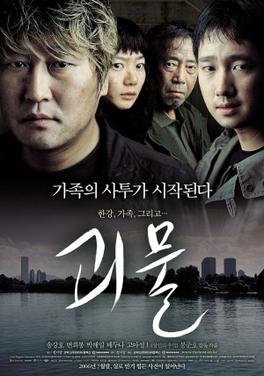In all of the various interviews I had to give and applications I had to fill out before coming to Korea, the question always came up: How much did I actually
know about Korea?
"Well," I'd reply, "I've seen a lot of Korean movies."
And if the interview was with a Korean, they'd invariably look at me like I had two heads. "Really?"
I once rattled off "the list" to a Korean-American expat when he asked me which ones I had seen. Probably about halfway through (after the initial shock), he shook his head and had this look on his face like "you are a tremendous dork."
It was amusing at first, but now it just grates on me. Really, why would I lie about something like that? Given the whole
hallyu movement going strong in East Asia (and, to an extent, around the world, courtesy of Asian fetishist nerds like Quentin Tarantino and popular movies like
Oldboy), it's not at all unreasonable that some goofy-looking weigukin might actually have seen
My Sassy Girl or
The Host. But I'll grant that, in some respects, I'm a bigger movie geek than nearly any other white person I've run into so far.
I'm getting ahead of myself, here. My point is mainly that South Korea has a pretty decent movie industry going on here, though the budgets are nothing like the giant cesspool clusterfuck of money that is Hollywood.
What I've seen so far has been rather brutal (unsure if East Asia has a different aesthetic or if what gets exported is only the brutal stuff movie nerds have come to expect from East Asia, eg
Battle Royale, Takashi Miike stuff,
Oldboy, etc), so I'll start off my series of recommendations with a rather cute, inoffensive little piece called
Gwishini sanda, internationally titled
Ghost House, by Kim Sang-Jin. This was one of the first Korean movies I ever saw (maybe even
the first, but by this point I can't remember anymore). Unfortunately, it also seems to be one of the most obscure titles on my list, so the odds of you being able to actually see it are nill; the only movies by Kim Sang-Jin on NetFlix are
Attack the Gas Station and
Jail Breakers, neither of which I've seen. If I find it here, I'll pick up a copy to gift to someone (since Aspie_Dev already has a copy, it wouldn't make sense to keep it for myself).
It's kind of like the recent Ricky Gervais vehicle
Ghost Town: The protagonist finds unwittingly finds himself able to talk to ghosts, a useful skill considering the house he just bought is haunted, and ends up working through the issues of the deceased half of a couple. The similarities end there, though. It's got a bit of the typical South Korean melodramatic sop to it at the end, but nothing over the top. It's also probably one of the few movies I can comfortably recommend watching with your kids, should you have any. (Which is why I put it first on the list—the rest are not so inoffensive.)
Oh! I lied. Here, you get a bonus recommendation in this post, one that NetFlix
does carry (and which I've seen for sale even in the FYE at the Palmer Park Mall; if you can get it White Bread Country, PA, you can get it just about anywhere):
The Host. It's a bit scarier/more intense than
Ghost House but still rather "mainstream." Not to be confused with the new novel by Stephenie Myer (ugh),
The Host came out in 2006 and was a phenomenal hit in South Korea, absolutely huge—like
Titanic huge.

In 2000, a Korean mortician working for the US military dumped a whole bunch of formaldehyde in the Han river in Seoul, under military orders. That real-life incident was the basis for this Korean version of
Godzilla, which is one of the rare South Korean movies to get the thumbs-up from
North Korea as well. The movie's take on America and Americans is pretty subtle and nuanced, but there's enough fodder in there for Kim Jong-il to consider it anti-American enough for North Korean consumption.
The story focuses mainly on a dysfunctional-but-lovable family as they, along with the rest of Seoul, find themselves terrorized by a bizarre fish-monster with a voracious appetite and a surprising amount of cunning. Song Kang-Ho pretty much steals the show as Park Gang-du (far left in the poster), though Park Hae-Il was also one of my favorites (far right). Despite being a monster movie,
The Host has plenty of laughs, a horror/monster movie more in the tradition of
Army of Darkness or
The Frighteners than
The Exorcist or
Jaws.And that's enough for now, before I geek-out overmuch and start going on about Kim Ji-Woon or Park Chan-Wook or so on. Seriously, go pick up
The Host or NetFlix it or whatever it is that you do. You won't regret it.





















